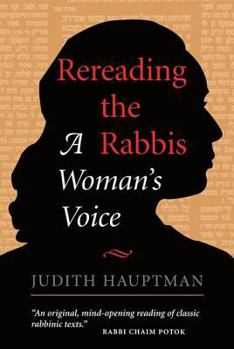Rereading The Rabbis: A Woman's Voice
Select Format
Select Condition 
Book Overview
Fully acknowledging that Judaism, as described in both the Bible and the Talmud, was patriarchal, Judith Hauptman demonstrates that the rabbis of the Talmud made significant changes in key areas of... This description may be from another edition of this product.
Format:Paperback
Language:English
ISBN:0813334063
ISBN13:9780813334066
Release Date:December 1998
Publisher:Routledge
Length:300 Pages
Weight:1.10 lbs.
Dimensions:0.7" x 6.1" x 9.1"
Customer Reviews
4 ratings
Good but flawed
Published by Thriftbooks.com User , 16 years ago
The problem with Hauptman's book is not her analysis or methodology, per se, but her motivation. She seems to have a deep personal anxiety that drives her need to make the rabbis fit into a progressive model of history that makes them the precursors of modern values. The need to try to make them fit into some sort of feminist model in order to "defend" them and make them palatable for modern readers seems to me to be as flawed as the model that reads them as despicable for their patriarchal values. The analysis of the midrashic and talmudic texts that demonstrates a complex attitude towards women -- what Hauptman calls "benevolent patriarchy" -- is interesting and important. But Hauptman falters because she writes from within the religious tradition and needs to see these texts as somehow continuous with her own values as a modern feminist. A less personally invested reading -- which really would only entail dialing down some of her rhetoric in defense of the rabbis as "contextual[ly] feminis[t]" -- would make the work a more powerful and important critical contribution to studies of Jewish theology. Of course, the caveat I have to mention: I am by no means an expert on the Talmud, so while Hauptman's readings seemed more or less convincing to me, I do not know the original texts nor enough about the history of their composition to say whether or not they are truly valid.
A Mostly Convincing Defense of the Rabbis
Published by Thriftbooks.com User , 23 years ago
Rabbinic Judaism reflects and reinforces a patriarchal society, giving men greater legal rights and religious roles than those allowed to women. Hauptman acknowledges this, but sets out to prove that *within this context,* the Rabbis of the Talmud are suprisingly liberal towards women, extending to them greater rights and protections than one might expect (and certainly more than the Torah requires).In large part, Hauptman succeeds in her project. The discussions of Sotah (the test for unfaithful wives), marriage, divorce, rape and inheritance are particular successful in demonstrating a gradual change in favor of women. In other chapters, where Hauptman is trying to explain or justify rabbinic attitudes in themselves (without the comparison to Torah), she is less successful. For example, Hauptman argues that the rabbinic laws restricting women's ability to provide testimony in court and limiting their participation in religious rituals are *not* based on a misogynist view of women as defective, stupid, or untrustworthy. Instead, she argues that these rules are based on women's lower social status. "You can't testify against a man, even though you're likely to be honest, because you're socially inferior" does not seem to me like much of an improvement over "you can't testify because women are stupid, flighty and likely to lie." I found these chapters interesting, but ultimately unpersuasive.Hauptman writes clearly and does a good job of providing context for non-scholars. The early chapters are easier to follow and therefore provide a good introduction if you are not a Talmudic scholar. Although not an easy read, I would say this is book is accessible to anyone who is willing to take the time to follow Hauptman's arguments and think them through.
The first true feminist reading of the Talmud
Published by Thriftbooks.com User , 25 years ago
There seems to be a great deal of antagonism between feminists and talmudists. It's refreshing to read a book by someone who is both. The talmud isn't the Misogynistic text some make it out to be, and feminism isn't sacreligious. the two can reside together, and both gain from the proximity. Talmudic study is enlightened by feminist methodolgy and crtique. Feminist studies can learn from the talmud how to deal with a real-politik that is far from perfect. The book is a must for anyone who cares about Judasim in the real-world.
Great book! Informative, thoughtful, balanced.
Published by Thriftbooks.com User , 25 years ago
Talmudic scholar Judith Hauptman looks in detail at Talmudic passages concerning the roles and rights of Jewish women. She reads each passage in the context of its development through the years of Rabbinic activity, drawing on the Mishnah, Tosefta, and both Talmuds. Even the newcomer to Talmud will begin to gain an understanding of Talmudic legal reasoning from her careful analyses.Hauptman's thesis is that the Rabbis of the Talmud sought to improve the legal status of Jewish women beyond what Biblical law originally accorded women. In support of her thesis, Hauptman shows the evolution of legal theory and practice pertaining to women through the Talmudic period.The book is gracefully written and carefully argued. It is riveting reading for anyone interested in Jewish Women's Studies.






